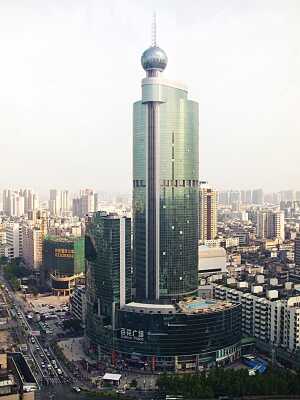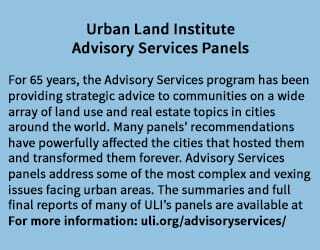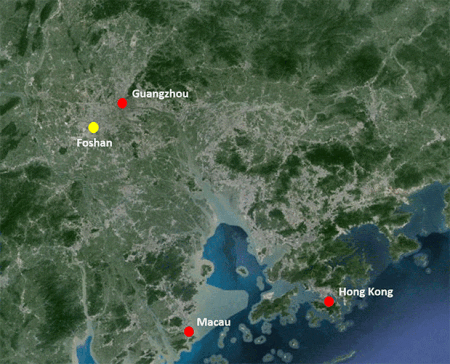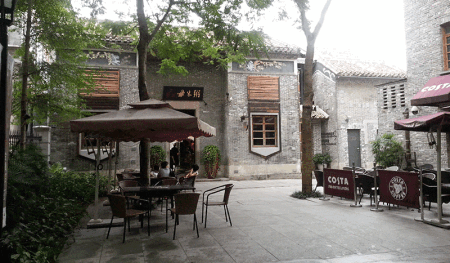Over the past few years, ULI has conducted several Advisory Services panels in Asia, each exploring the unique issues facing thriving and complex urban areas. This article explores the details of one of those panels, held in Foshan, China, in November 2015. ULI believes that the recommendations of the Foshan panel are applicable to many Chinese cities of similar size and composition.
Foshan lies at the heart of one of China’s most fertile deltas, across the Pearl River from the Guangdong provincial capital of Guangzhou. With a trading industry that has been in place since the 17th century, it is the ancestral home of many leading business figures in nearby Hong Kong and Macau. It was also the birthplace of Yip Man, the sifu, or teacher, of martial artist and actor Bruce Lee.
Today, Foshan is a powerhouse—with 7.3 million people and a gross domestic product topping US$100 billion—and serves as an exemplar of both the achievements of and challenges faced by China’s emerging metropolitan areas. Among the factors in the city’s success has been its proximity and ties of kinship to the special administrative regions of Hong Kong and Macau. This provided a significant advantage to Foshan at the outset of China’s reform era.
Yet, with all its success, Foshan faces the same challenges as most cities around the world—attracting and retaining talent.
The city asked ULI to assemble a multidisciplinary team of land use, development, finance, design, and economic development experts to look at the larger issues facing the city, with a focus on the Chancheng District and Shui On Land’s Lingnan Tiandi development.
Chancheng—Foshan’s original city center—is considered the heart of Lingnan culture, a premodern artistic and cultural movement that blended Southeast Asian and Cantonese influences, including opera, cuisine, and herbal medicines.
Located in Chancheng is Lingnan Tiandi, a new and large mixed-use development that has as its centerpiece a retail area that makes excellent use of both repurposed historic buildings and new structures that mimic the old. The ULI panel observed that the quality of the urban design and architectural finishes at the Lingnan Tiandi retail is among the highest in China.
Despite this spirit and the city’s rich heritage and size, however, Foshan is one of the least-known great cities in China. It needs to regain its stature as the center of the Pearl River Delta and of the economy of southeast China. The panel believes that against this historic and cultural backdrop, the city should begin to build its brand as a means to attract and retain talent.
Live/Work/Play: Integrating Functions
What young, educated people want and expect from the places where they live has changed. One challenge facing Foshan, and Chancheng specifically, is the need to integrate the functions of live, work, and play—an approach that has been at the forefront of urban regeneration in the West, panelists said. Lingnan Tiandi has proposed all elements of this approach, but only the “play” portion of the development seems to have been addressed so far.
The need for more people to live and work in central Chancheng should be the primary focus of city officials and the developer, the panel said. From the panelists’ perspective, the “live” portion of the equation is hampered by the extremely high cost of new living space and the lack of units in the older portions of the city that can accommodate young workers.
The panel recommended that the city consider providing more affordable/workforce housing for younger workers. One strategy suggested by the panel is converting some of the hundreds of thousands of square meters of proposed office space in the Lingnan Tiandi master plan into live/work units that allow a different class of tenants to reside in the city center.
Another major recommendation is that Foshan should improve its education system. Foshan University, the primary postsecondary educational presence in the city, has neither the status nor reputation of a top-tier university. The panel suggested the following approaches to improving this system:
- Create an urban campus. Young, educated people worldwide are drawn to urban campuses where they can collaborate with students, faculty, and entrepreneurs.
- Recruit a world-class university to attract top talent. Foshan has already created the SYSU-CMU International Joint Research Institute (JRI). Located in the Shunde district of Foshan, the JRI is a three-way partnership among the Shunde People’s Government of Foshan, Sun Yat-sen University (SYSU), and Carnegie Mellon University (CMU). The panel recommends that, as part of the urban campus, a partnership similar to the JRI be created in Chancheng.
- Establish a center for entrepreneurship. The panel recommends the establishment of a Center for Entrepreneurial Studies in Chancheng. This center would address the need for greater understanding of issues facing entrepreneurs and the entrepreneurial community, specifically related to existing and emerging industries in Foshan. Components of the center should include the following:
- a faculty of local, national, and international experts;
- a student venture fund (SVE) providing seed money to help students create their own ventures;
- an advisory board of entrepreneurs and international experts; and
- a full-time staff to organize programs.
Maintaining Authenticity and Brand Clarity
One issue that continues to surface everywhere is authenticity. A key to attracting and retaining great talent is providing a vibrant, connected cultural environment for tourists and city residents alike.
The panel believes that Foshan has a great advantage in this regard with the cultural assets mentioned earlier. Each of these elements should be expanded to not only meet the needs of the city’s population, but also serve as a key attraction for tourists.
In addition, Foshan should raise its profile as an international tourism destination, the panel said. The savvy international traveler has been inundated with options and choices through the internet, combined with easing of travel restrictions in China, increasing wealth, and additional leisure time. Successful tourist destinations have certain aspects that set them apart from similar destinations.
Conclusion
Foshan’s leadership has accomplished a broad set of complex business objectives for the entire city, including attracting large back-office operations and new manufacturing and industrial design operations to its outer districts. The ULI panel believes that with similar leadership, the transformation of Chancheng will help Foshan compete in the face of the tidal wave of change descending on urban China. A focus on strategies to improve opportunities for education, live/work/play places, and authenticity in the city center will improve the ability to attract and retain talent for the entire city.
This article also appeared in , a publication of CityNet, the largest association of urban stakeholders committed to sustainable development in the Asia Pacific region.
Thomas Eitler is a senior vice president for the Urban Land Institute, a global nonprofit education and research institute that focuses on issues of land use, real estate, and urban development.








